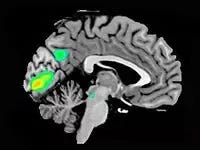
I was raised in religion for a good number of years. I come from a relatively conservative family, and church attendance was a requirement. However, I have always lacked the wiring for faith. Apparently, there is a part of the brain that lights up during prayer, or other types of spiritual practices. This area of the brain is called the Angular Gyrus.
It lights up all pretty like that, and apparently is the root of faith. Well, go figure, that doesn’t happen in psychopathy, so going to church and sitting through religious lectures were tedium to me, and poking holes in the assumptions there was a hobby of mine. I spent a good deal of my Sunday school time sitting outside because I had yet again been kicked out. It is inconsiderate, it seems, to point out the flaws in the thinking of people that want you to follow the bouncing ball.
In one of those situations, a question was posed to the class. The scenario was posed that if gunmen came in and held everyone hostage and executed anyone that when questioned admitted to being a Christian. One by one they go to each person and ask, do you deny Christ?
“No said all the sheep. We would never do that….”
They came to me;
“Of course, I would. I like living.”
“You will be denied entry into Heaven if you deny your relationship with God,” was the retort.
“Buuut… suicide is a sin… and you know that saying that you are a Christian will get you shot. You are committing suicide by making this admission.”
“God will forgive you that sin, you didn’t deny him or his son. You would be welcomed into Heaven”
“So if I deny Christ, I’m going to hell, but if I commit suicide I won’t? How does that work?”
“God wants you to always be honest about your relationship with him.”
“But not preserve the life he gave to me? That doesn’t make any sense.”
This went back and forth for a time, but the general message was that there was no real difference in the gravity of the sins, but denying God was worse and I was off to hell. Repeating my assertion that this didn’t make any sense, I was summarily dismissed to wait outside for the class to conclude.
Yet another time they were teaching us that God would never tempt us. This had to do with the story of Jesus’ forty days and forty nights in the desert if I recall correctly. The whole thing was, God won’t tempt you, if you are tempted that is the devil’s work.
Again, this made no sense to me.
“If God doesn’t tempt humans… why was the tree of knowledge in the garden of Eden?” I asked, confused.
God did not tempt Eve to eat of the tree. Satan did that in the form of a serpent,” I was promptly reminded.
“Yeah, yeah, I know that… but God put the tree there in the first place, and not only did he put it there, he told them, ‘Don’t eat from this tree no matter what’. Why was the tree there to begin with if humans weren’t supposed to eat from it? I mean, he might as well have placed a big neon sign over the tree with arrows pointing to it saying, ‘eat me eat me’. What was the point of all that if not temptation. He made us, right? He can see everything right? Then why is the tree even there to begin with?”
“That was a test of their faith”, came the curt reply.
“So it was temptation. He wanted to see what they would eat from his sin tree. They did, he knew that they would, and then kicked them out. How does that make sense? Weren’t they basically children? Children always do what you have specifically forbidden them to do, how was this outcome surprising to him? That seems like setting them up for failure, and also temptation.”
“God gave man free will,” now with a terse smile.
“And then he’s surprised by the outcome? How on earth are these two people supposed to understand the gravity of that tree or the choice that they are making. God does, and there is no imaginable reason for it to be there unless it was an unfair temptation which makes it a d*ck move on his part. It would be like my parents leaving a bowl full of candy on my bed and saying, “now don’t eat that. It’s going to get eaten, and I mean like allll of it, and then kicking me out of the house for doing so. Who gives people free will and the first thing he does is give them an impossible choice? Obey him, which is not free will in the first place, or eat from the temptation tree which gets you kicked out forever. How is that reasonable?”
“Please go outside and wait for your parents. I won’t tolerate interruptions in Sunday school.”
This happened a lot, and you would think they would just tell me not to ever come back, but they really can’t and stick with their whole “we accept everyone” narrative. It was quite obvious that the teachings in organized religion were going to have no effect on me, and when I reached a certain age I was told the decision was mine. Granted, this was likely their polite way of removing the need to explain to church friends why I couldn’t behave myself, but who cares? I didn’t have to go anymore. Bully for me!
You might think based on this that I don’t think that there is a God, or that there isn’t anything beyond what I can see. That isn’t the case, however. I have had plenty of weird experiences and know that I don’t know what I don’t know, that I don’t have the hubris to make such a proclamation. I have no idea what comes next, and I have had loads of odd things that I have been told about by the people that have experienced them, have read about, or have seen for myself. The most recent of which is when I looked at one of our windows and could see the impression of what appeared to be the sides of two hands cupped around someone’s eyes so they could look in at night.
Imagine someone looking into your window like this:
but there is no person there. Just the imprints of the sides of their palms and a mark where their forehead would be. Only, there was no one there, because there couldn’t be. This was on the second-story window, on the outside, with nothing but a sheer drop where the person would have to be standing. Something like this:
No one could have been there, but the impressions were unmistakable. In a little while, they were gone. Not a trace left.
Do I have any idea what caused it? No, and what’s more, I don’t need to know. The world is full of things that I cannot explain, and I have no need to try. I am perfectly content to not have that information. What that translates to is that I understand that someone believing in something that I have no evidence exists means nothing about the existence of that thing. I have had many people try to justify their religion to me, and their disbelief in religion to me, but what it all comes down to are people that don’t actually know.
Sure, you can have faith and believe that God is guiding you. Who am I to question that?
Sure, you can not believe in anything past what you can see. Who am I to question that?
What I know is that I don’t know. Maybe when I die I will find out, maybe it’s just more unanswered questions. I don’t really care. No matter what it will be new to me, and new means interesting. I do wonder why people are so invested in stories that don’t make a great deal of sense logically, such as the ones above. If you point out the flaws in the logic, they get defensive and will shut you down. Frankly, it doesn’t matter what side of the aisle you are on in the religious space. Fully for, fully against, it’s still a belief. You will never know until you die, and you may not even know then.
I believe that people need to have some kind of belief in something. If they don’t, their minds will find something that fills that aspect in their brains. Years ago I made the comment that the more people leave belief in spirituality behind, the more zealous they become in terrestrial things, but the effect is not the same in the brain, and a kind of insanity appears to set in. As time has gone on, this has become more and more apparent to me.
Psychopaths lack this need, but that doesn’t mean we don’t observe its effects in society. It is very interesting to me that people have such staunch opinions regarding religion in one direction or another, but it makes sense to me as well as humans are inherently tribalistic. Religion is just another apparition of that aspect of living.
Regardless of the origin of most religions, spoken on high, or written by man, the outcome is the same. It is a governing body of human behavior, and it is the eyes in the dark that sees all you do. There are of course exceptions to this rule, but a large number of them fit this mold.
One of the notable exceptions to this is Buddhism. I have a theory about the teachings of Buddhism and how they came to be. I have read what the goals of Buddhism are, and how to achieve them. When you examine what the outcome is meant to be, especially in line with the relationship with emotions, it seems to me to be leading a neurotypical person from being as they are towards a more psychopathic way of experiencing the world. I can go into this in more detail in a later post if you would like, but for now, I will just speak to my theory about it.
Of course, people will tell me that the story behind Buddhism doesn’t match my theory, as it is told that a prince left the world of opulence to learn the meaning of suffering and then overcome it. If I were trying to sell a way of being, I would create a pretty cool backstory as well. It’s good marketing. Before any Buddhists get up in arms about my dismissal of the religious mythos:
You’re not supposed to be attached to that feeling of being offended. Did you do your daily meditation?
It’s a theory, nothing more.
I have watched how neurotypicals function and there are a lot of times that I see their emotions unnecessarily cause them suffering. It is not something that I understand. In my life, if something creates an unwanted situation, that something is excised, but neurotypicals can’t do this. It took me some time to understand that this was a ‘can’t’ situation, not a ‘won’t’ situation. There are only so many times I can ask, “Why do you care?” before I come to the conclusion that this is not voluntary, which brings me back to the purpose of Buddhism.
It is self-centered in the sense of enlightenment. Unless of course, you are talking about enlightenment of not only yourself, but of those around you. It is my understanding that is only some practices of Buddhism that attempt to assist others in their path, however, and those are not the ones we will be discussing today, because screw other people, this isn’t about them.
Buddhism is about logic and pragmatism. It is about little dwelling on the emotional aspects of the brain and the trappings of this world. My hypothesis, my theory, is that the idea behind Buddhism came from a psychopathically wired person attempting to understand why their own thought processes that their way of being presented was so different and had fewer problems than the neurotypical way of thought.
When you are psychopathic, and you are trying to sort out why those around you seem to trouble themselves with unnecessary burdens, it stands to reason that at least one of us was like, “Hey, maybe try doing it this way?” Perhaps they encouraged people to try and experience the world as they did, try to let go of those burdens, and try to be less affected by emotions. Collect enough followers that agree with you and there you go, Buddhism.
So, if that is the case and it was conjured as an attempt to understand a psychopathic mindset and how it could be not only harnessed and evolved, but assist those around the original practitioners, I could see the principle of detachment being rather similar. However, what it means to the people following Buddhism versus what a psychopath experiences, I could see being very different experiences altogether.
One of the best koans that I have ever read is about attachment.
Tanzan and Ekido were once traveling together down a muddy road. A heavy rain was still falling.
Coming around a bend, they met a lovely girl in a silk kimono and sash, unable to cross the intersection.
"Come on, girl" said Tanzan at once. Lifting her in his arms, he carried her over the mud.
Ekido did not speak again until that night when they reached a lodging temple. Then he no longer could restrain himself. "We monks don't go near females," he told Tanzan, "especially not young and lovely ones. It is dangerous. Why did you do that?"
"I left the girl there," said Tanzan. "Are you still carrying her?"
This pretty much summarizes a couple of things that I speak about when it comes to psychopathy. There is no attachment, nor emotional drive to do what the monk did. It was a necessary action, it was done, and it was forgotten. The response by the other monk is reminiscent of what I deal with from neurotypicals. They assume there had to be an emotional reason to act, and an attachment to that action. No matter how much I try to explain to them that is not how I function, it is often left unheard.
I have been around some strange events, and seen plenty of things that I cannot explain. Because of this, I don’t dismiss people’s faith, their spirituality, their beliefs, or their lack of them. it would be hubristic if I did. All I can say is, I don’t know, and I am good with that. The basis for most religions when you sort out the “believe us or die” part, is to live the best life you can, and don’t f*ck up the world. Seems reasonable to me, and if you are the sort of person that is the “believe us or die” regardless of what ideology you are, that would be part of the problem in the world, not the solution.





Jed McKenna is a perfect example of psychopathic spiritual teacher:
"My worldview is not informed by any teacher or teaching. I assert no belief, original or second-hand. I am not passing anything down that was passed down to me. Every square inch of my understanding comes from exploration, perception, reason, and logic. You might say there are higher ways of knowing than reason and logic, and being heart-centric, you might believe it, but it’s not true. It’s the heart that will mislead you, every time. Reason and logic drive me straight into the absolute certainty and inevitability of nonduality, and all else follows naturally from that. That's the way the world unfolds."
https://jedvaita.com/
"Frankly, it doesn’t matter what side of the aisle you are on in the religious space. Fully for, fully against, it’s still a belief. You will never know until you die, and you may not even know then."
This is exactly why I regard atheism (and Scientism, its most modern iteration) as a modern religion. They believe not having faith, but their faith involves believing in nothing insubstantial.
I'm a Omnist, myself. A meta believer, an apostle of Life.
I feel as though beliefs are of the essence, when it comes to shaping the believer, which is why institucionalized religions are invariably a two edged sword... that purports to liberate but ultimately ensnares adepts in paradoxes seemingly designed to arrest critical thought from the onset - as the ones from your Sunday school memories.
The true religious spirit ( as hinted in the etimology of the word) is all about reconnecting us incarnate souls to the unnamable Source, and overcoming all illusory attachments to this transient reality. This is observable in the philosophy of Buddhism indeed, although it's worth noting that it too has its own politized branches - much like other religions also usually have their philosophical merits.
I concur with your hypothesis that Buddhism may have been established by a well meaning person having the psychopathic mindset. At very least there are striking similarities in attitude between that and the enlighnened mind, as attested by Kevin Dutton. Well... at least, where it concerns the psychopathic mind that is not weighed down by hubris - for that which happended to be could very well decide to go the opposite direction, to become a cult leader.